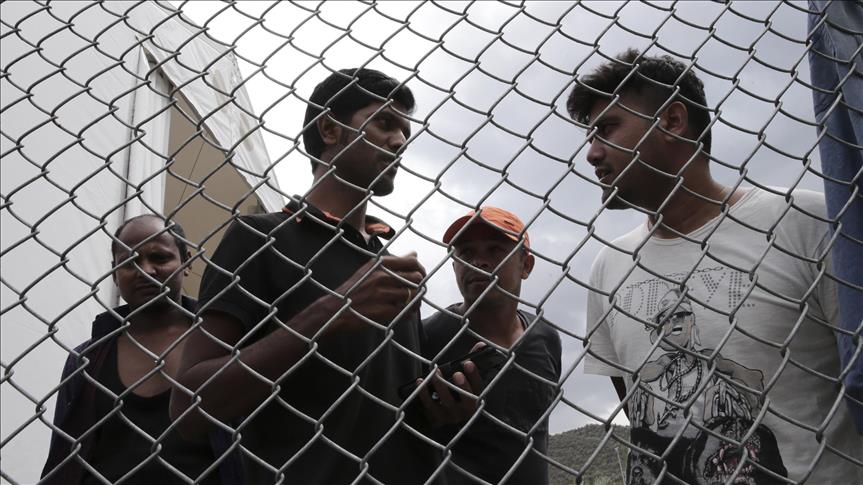
By Idyli Tsakiri
LESBOS, Greece
“We have no permission for go out. Now we are prison [sic],” a 17-year-old Pakistani migrant texted, along with a sad emoji face, locked inside a refugee camp on the Greek island of Lesbos.
Just under a hundred minors aged 12 to 17 find shelter in the rooms reserved for them. “We have beds, air conditioning, and showers, but we cannot go out,” the teenager, who goes by the pseudonym Dilawari Ali and has been living there since June 15, told Anadolu Agency.
At ages when children are supposed to be exploring life and running free, the minors stranded at Moria camp, Lesbos, can take a walk outside the camp once a week for six hours and that is it, Ali explained.
But he is grateful for the security the camp provides him and his peers. “We are safe, if they [Greek authorities] feel any problems coming they take us out of Moria,” he said.
That was, indeed, the case Monday night, when clashes broke out in the camp between migrants of various ethnic backgrounds, and as the violence escalated, fires set by the migrants themselves burned down almost half of the camp.
Immediately the minors were transported to another camp, Lesvos Solidarity (formerly known as PIKPA), which generally accommodates “vulnerable cases,” Efi Latsoudi, a member of the volunteer NGO which runs the camp, told Anadolu Agency.
The minors spent two days at the camp and were returned to Moria on Wednesday morning.
“It was an emergency situation. They were in danger because of the fire, because of the racist attacks in Moria, and they took them out,” Latsoudi said of that night.
“It was like breathing,” she said, describing the minors’ response to their short break from Moria. “They were very happy, they were kissing us, telling us thank you.”
Schooling, but exclusion
Asked which camp he liked better, Ali wavered.
“At PIKPA they have not any facilities for us like Moria, but PIKPA has freedom,” he said.
“I like both,” Ali concluded in a text message interview, as he was not allowed outside Moria camp and journalists are not allowed inside.
“It is a closed place only for minors, but it is kind of a prison,” Latsoudi described the center for minors in Moria. “But for us this is no way to treat minors. Minors should be in an open shelter, not in prison,” she added.
As for the night when the children were taken to Lesvos Solidarity, Latsoudi said, “They felt freedom and human contact with other people.”
“There is an effort now in Moria to have activities, to have volunteers, to have a staff to do things with the kids. But I think that the fact that it is a prison and it is a camp, it creates the felling that they are excluded, they are in a separated place,” she added.
At Moria, regular staff accompany the minors daily, said Ali, and some schooling is provided. “Every day five or six teachers come for us,” Ali said. They teach them Greek, English, and math.
Even though Ali heard from his friends who were relocated to centers in Athens that the camp in Moria is superior, he still asks to be moved to the Greek capital.
“I can’t stay here. I’m responsible for my family. I have to go there,” he said.
Humane conditions
Ali’s family sold off their entire fortune in Punjab, Pakistan, holding on only to their house, so Ali could afford the trip to Greece, he said. In total, Ali said he gave 3,000 euros to smugglers, a price tag that made it impossible for any other family member to travel with him.
Now that he made it, Ali wants to move to Athens and work as a baker with his uncle, who has been living there for the past six years.
“I came here just to make money and do [sic] better conditions for my family,” the 17-year-old told Anadolu Agency, explaining that his parents and his two younger brothers back in Punjab depend on him.
Thanasis Voulgarakis, member of the Lesvos Solidarity group, suggested that the minors be relocated to buildings in Lesbos so that they can live under more humane conditions.
“I see so many empty buildings in Mytilene. If the authorities were willing to do it, they could have rented a large building to accommodate them,” he said, adding that even though no one building could house 100 people, they could be split into smaller groups and hosted in a number of facilities.
Ali arrived in Lesbos on March 31, almost a week after the EU-Turkish deal blocked migrants and refugees from going farther into Europe on their own. Under the deal, migrants who illegally enter Greece have to remain at their point of arrival until a decision is made on their asylum request.
According to official data provided by Athens, out of the almost 60,000 refugees and migrants currently living in Greece, more than 3,500 are unaccompanied minors.
The 96 stranded minors of Moria will gradually be relocated when appropriate facilities are established to accommodate them. So far a few have moved to camps in the Greek capital but are not satisfied with the conditions, Ali said.
As for Ali’s plans once he reaches Athens, his final destination, he said: “I will go to my uncle’s home. Make and eat Pakistani spicy food.”
Anadolu Agency website contains only a portion of the news stories offered to subscribers in the AA News Broadcasting System (HAS), and in summarized form. Please contact us for subscription options.







